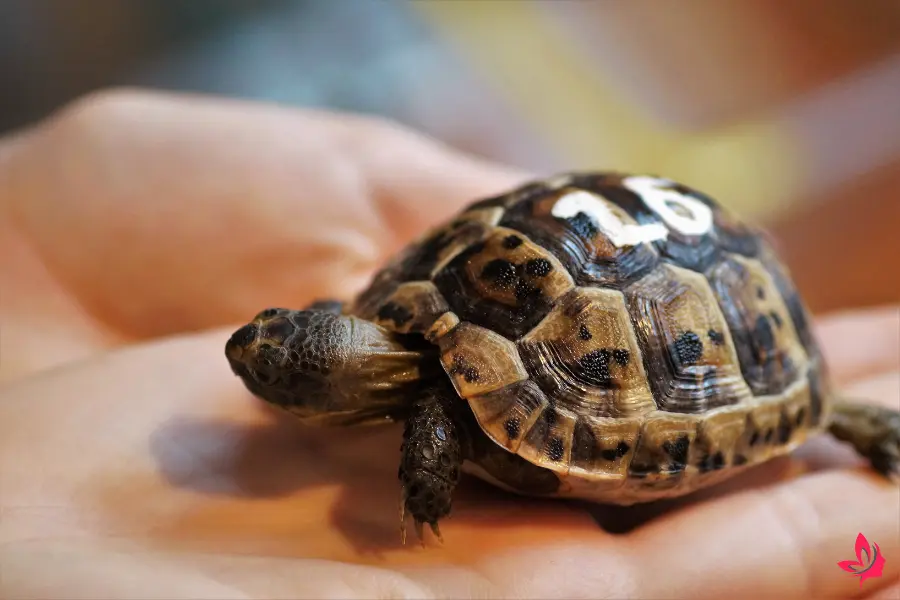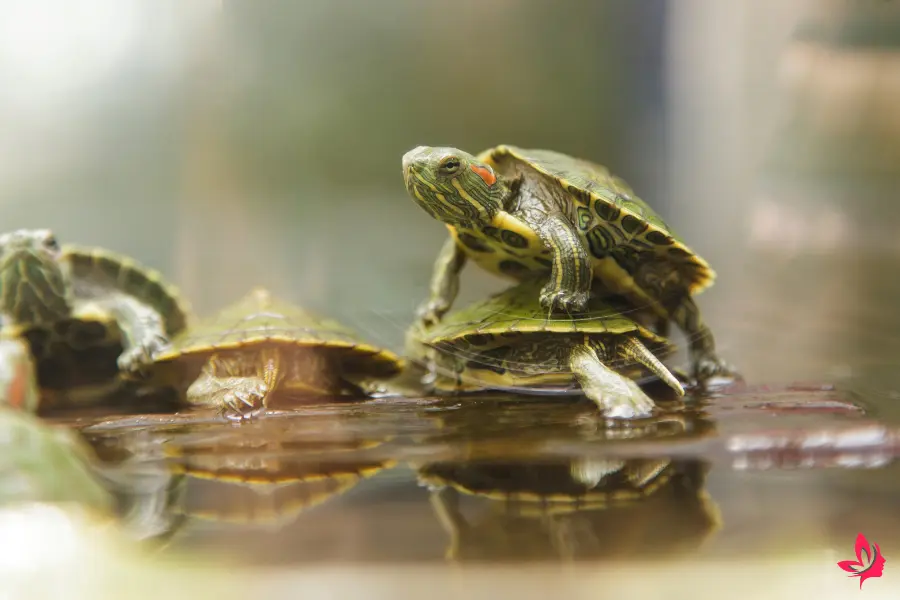Turtle swollen eyes home remedy: Turtle swollen eyes can be a concerning issue for any pet owner. Fortunately, simple and effective home remedies are available.
One important solution is using carrot juice soaks, which can help reduce swelling and irritation.
Additional treatments include non-steroid eye drops and saltwater rinses, offering gentle care for your turtle’s eyes.
When a turtle’s eyes are swollen, it might indicate a vitamin deficiency or an infection. Implementing vitamin-rich carrot soaks and ensuring a proper diet can address these concerns.
By understanding the causes and remedies, you can ensure your turtle stays healthy and comfortable.
These home remedies are practical and easy to incorporate into your turtle care routine.
For detailed guidance, you can check out eye drops designed for turtles and other home treatments that can significantly improve your turtle’s eye health.
These steps can improve your turtle’s well-being and give you peace of mind.
What are the Causes of Turtle Swollen Eyes?

Swollen eyes in turtles can be a troubling sign of underlying health issues. These problems are often linked to environmental factors, nutritional deficiencies, and infections, which must be identified promptly to ensure effective treatment.
Common Eye Problems in Pet Turtles
Pet turtles often have eye problems, such as puffy or red eyes and a complete inability to open their eyes. These issues can arise from bacterial or viral eye infections.
A turtle with swollen eyes may show signs of a respiratory infection, which can escalate into serious health problems if not promptly addressed.
Other possible causes of these symptoms include vitamin A deficiency and secondary bacterial infections. Such conditions often require a closer look to identify shortcomings in the turtle’s care routine.
Environmental Factors Affecting Turtle Eye Health
Turtles’ environment heavily influences their eye health. Poor water quality in their tanks, improper lighting, and inadequate basking spots can all contribute to eye issues.
Contaminated water fosters the growth of harmful bacteria, leading to infections. In addition, a lack of UVB light affects turtles’ ability to metabolize vitamin D3, leading to vitamin deficiency and potential eye problems.
Maintaining the proper water temperature and providing ample clean water are key to preventing these issues.
Identifying Symptoms and Underlying Causes
Identifying symptoms of turtle eye issues involves careful observation. Swollen, red, or runny eyes are common signs of irritation.
Swelling may have underlying causes, such as a fungal infection or debris from tank decorations.
Signs of eye problems should be addressed promptly to prevent the gradual breakdown of epithelial tissues.
Evaluating the turtle’s diet for rich foods like sweet potatoes and ensuring proper tank filtration are essential steps in identifying and addressing the root cause of any eye issues.
Home Remedies for Treating Turtle Swollen Eyes

Turtle swollen eyes can be caused by vitamin deficiency, poor water quality, or improper habitat conditions. Addressing these factors can help improve turtles’ eye health and reduce issues like eye infections and puffy eyes.
Using Vitamin A and Beta Carotene
Vitamin A plays an essential role in maintaining turtle eye health. Vitamin A deficiency can cause eye problems in turtles, including swollen eyes and infections.
Foods rich in vitamin A, such as liver, or supplements like beta carotene, can help prevent these issues. Carrot soak is another good option because carrots provide beta-carotene.
A carrot soak involves placing the turtle in a diluted carrot juice solution for short periods over a few days. This method supports eye health by allowing direct absorption of beta carotene through the skin.
Ensuring Proper Habitat and Environmental Conditions
Improving water quality and ensuring proper habitat setups are critical for preventing eye swelling.
Poor water quality can lead to health risks, such as bacterial eye infections and irritation. Regular water changes and proper filtration systems minimize harmful bacteria.
Aquatic turtles benefit from basking spots and UVB bulbs that simulate natural sunlight, which is vital for their overall health.
Temperature should be monitored to ensure it meets the turtle species’ needs. For instance, a red-eared slider needs a water temperature of around 75-78°F.
Dietary Adjustments for Better Eye Health
A turtle’s diet significantly affects its overall health, including the health of its eyes. Providing a varied diet that includes leafy greens such as romaine or red leaf lettuce and commercial diets rich in vitamins is important.
These foods support the immune system and prevent vitamin deficiencies that may cause eye infections. Additionally, supplementing a good diet with a quality pellet ensures that turtles receive all necessary nutrients.
Proper feeding practices help explore possible causes and solutions for eye-related health issues in turtles, effectively manage eye problems, and support good health.
Preventing Future Eye Issues in Turtles

If not properly cared for, pet turtles are prone to eye infections and other health risks. Keeping their habitat clean and recognizing symptoms early are crucial to their health.
Consulting with experts ensures that underlying causes are addressed promptly.
Regular Habitat Maintenance and Cleanliness
Turtles’ eye problems can often be linked to poor water quality. Contaminated water can irritate or infect turtles’ eyes.
It is important to clean their tanks regularly and use a proper filtration system to maintain hygiene. Maintaining an appropriate water temperature and ensuring a basking platform for aquatic turtles can help avoid eye swelling and other health issues.
Tank decorations might accumulate harmful bacteria over time. Cleaning them alongside regular tank maintenance can prevent bacterial eye infections, a common health issue in turtles.
Additionally, periodically replacing UVB bulbs ensures that turtles receive enough light, which is vital for their immune systems and overall health.
Recognizing and Treating Other Health Risks
Apart from a turtle eye infection, respiratory infections can also lead to swollen eyes. Pet turtles should be monitored for clinical signs such as runny eyes and red eyes, which indicate secondary bacterial infections.
Identifying these early helps administer the best treatment, often involving specific turtle eye drops found at pet stores.
A turtle’s diet plays a significant role in preventing health problems. Ensuring a varied vitamin A and beta carotene diet helps maintain turtle eye health. Rich foods such as sweet potatoes or carrots can be included.
Consulting with Experts and Veterinarians
Regular consultation with veterinarians familiar with turtles ensures that potential eye issues are identified early. When appropriate, they can recommend human eye drops and other ophthalmic drops.
They can also help identify possible causes like environmental conditions or an improperly kept habitat.
Veterinarians usually have private practice experience, which is valuable in treating varied health conditions in turtles. Consulting them can prevent serious health problems like ear abscesses from untreated eye infections.
Access to professional guidance provides peace of mind and ensures the good health of pet turtles.
Best Practices for Turtle Eye Care

Turtle eye care involves a mix of good husbandry and swift action if problems arise.
Common issues include swollen eyes and infections, often linked to poor environmental conditions or dietary deficiencies. Addressing these concerns through regular monitoring and preventive care ensures healthy eyes in turtles.
Easy Tips for Maintaining Turtle Eye Health
Turtles’ eyes need proper attention to prevent eye infections. Clean water is vital, as poor water quality can lead to bacterial eye infections. To maintain optimal conditions, regularly test and change the water.
Include foods like sweet potatoes or romaine lettuce in a balanced diet rich in vitamin A. This helps prevent vitamin deficiency, a common cause of eye problems.
Proper lighting is crucial. UVB bulbs and heat lamps support the turtle’s immune system and overall health.
Ensure the basking spot is easily accessible, and that ambient temperature settings suit the turtle species. Simple measures like these minimize the risk of eye swelling and are considered among the best ways to maintain turtle eye health.
Long-Term Care for Different Turtle Species
Understanding species-specific needs ensures long-term eye care for turtles like red-eared sliders and box turtles.
A larger gallon tank with good filtration and plenty of clean water is essential for aquatic turtles. Terrestrial turtles need plenty of humidity and a varied diet.
Monitor for signs such as red eyes or runny eye discharge. These might indicate underlying conditions, such as respiratory infections or ear abscesses.
Appropriate tank decorations can prevent eye injuries, while prompt vet consultations help address more serious health problems.
Importance of Early Detection and Treatment
Early detection of symptoms like puffy eyes or white film on a turtle’s eyes can prevent issues from escalating.
Turtle owners should know clinical signs and differentiate between temporary irritations and signs of a more serious infection.
Home remedies like carrot soaks or turtle eye drops can relieve minor issues. However, if symptoms persist, seeking professional help from a reptile vet is crucial.
Timely intervention reduces the risks associated with opportunistic pathogens and ensures that underlying causes do not lead to prolonged health risks.
Final Thoughts
Turtle swollen eyes can often be managed with home remedies, but handling the situation carefully is crucial to avoid complications.
Various sources, such as Turtle Forum and Reddit, highlight common techniques, such as soaking your turtle in carrot juice and using specialized vitamin eye drops.
Regular monitoring of the symptoms is essential. Sometimes, the swelling could indicate a vitamin A deficiency, which might need veterinary attention. It is also recommended to monitor the turtle’s overall health, including its diet.
It’s important to remember that if home remedies do not improve the condition, consulting a reptile vet becomes necessary. Even when using simple treatments, make sure they are applied safely.
Key Takeaways
- Carrot Juice Soaks: Useful for mild cases.
- Vitamin Eye Drops: Consider brand options to ensure quality.
- Veterinary Consult: If symptoms don’t improve, seek professional help.
Frequently Asked Questions
Swollen eyes in turtles require careful treatment to ensure a quick recovery. It’s common to use home remedies and consult a vet for proper medication when necessary.
How to treat a turtle with swollen eyes?
Try a carrot soak or saline solution to treat swollen eyes in turtles. These methods can help reduce irritation and swelling. If the condition persists, seek veterinary help.
What medicine is good for turtle eyes?
Use eye drops specific for turtles that do not contain steroids. These drops are available commercially and can help reduce inflammation.
Can I use human eye drops for turtles?
It’s generally advised not to use human eye drops directly on turtles. Due to differences in formulation, these could harm the turtles. Avoid using human eye drops unless a veterinarian specifically recommends them.
Why are my tortoise’s eyes puffy?
Puffy eyes in tortoises can be caused by poor water quality, vitamin deficiencies, or infections. To prevent this, ensure the habitat is clean and appropriately set up and provide balanced nutrition.
What antibiotics are used for turtle swollen eyes?
Antibiotics should only be used under veterinarian guidance. The medications will depend on the specific infection and the turtle’s health condition.
How do you calm a swollen eye?
To calm swollen eyes, ensure the turtle’s environment is stress-free and quiet. Keep water clean and try gentle treatments like a saline rinse.
How do you give a turtle eye drops?
To administer eye drops, gently hold the turtle’s head steady and apply drops to each affected eye as directed. Follow dosage instructions carefully.
Why does my turtle look swollen?
A swollen appearance in turtles can be linked to underlying health problems such as infections or a dietary imbalance. Consult with a vet for a proper diagnosis.
How to make carrots soak for turtles?
A carrot soak involves juicing carrots and soaking the turtle in the juice for a short period. This method may help due to the vitamins in carrots.
How do you give medicine to a turtle?
Administering medicine requires gentle handling. Sometimes, you may need to wrap the turtle to ease the process. Follow specific instructions from a vet to ensure proper application.




